the free methodist church in canada
Historical Timeline
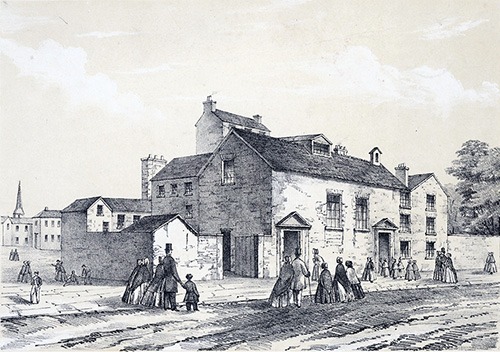
Back To Our Roots
As we journey forward, it is vital to remember and honour the historical past of our movement. Our roots ground us in a legacy of faith, resilience, and a commitment to justice and holiness that have shaped our identity and mission. Reflecting on the sacrifices, prayers, and vision of those who came before us inspires us to carry the torch of transformation into the future. By remembering our shared history, we gain clarity and purpose, ensuring that our steps align with the values and principles that have defined the Free Methodist movement. This timeline begins with the founder of Methodism, John Wesley.
Early Life of John Wesley
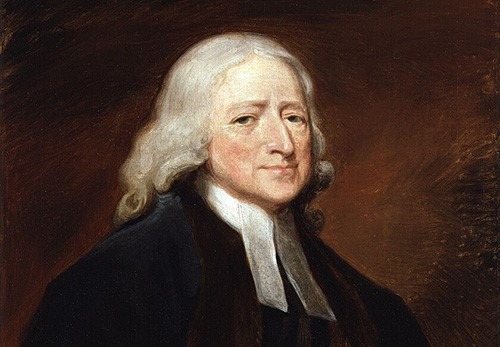
John Wesley is born on June 28 in Epworth, England.
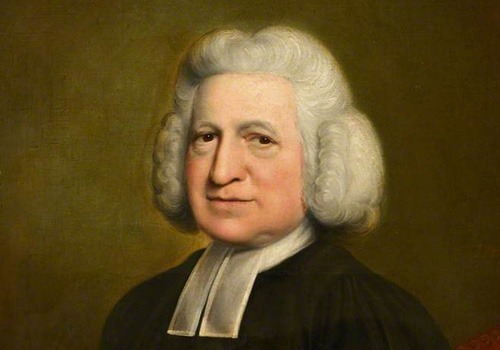
Wesley’s brother Charles is born. Charles Wesley becomes the beloved hymn-writer of the Methodist revival. His hymns endure to this day in many branches of the Christian church.
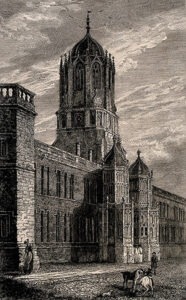
John Wesley begins his studies at Christ Church, Oxford.
John Wesley is ordained as priest in the Church of England.
The Methodist Movement
Wesley assumes leadership of the Oxford Holy Club, in which members are first called “Methodists.”
Wesley volunteers as missionary to the American colony of Georgia, returning to England in 1738 in spiritual turmoil.
Wesley experiences a profound spiritual awakening on May 24 at a meeting in Aldersgate Street, London, in which his heart was “strangely warmed.” This becomes known as his "Aldersgate Experience."
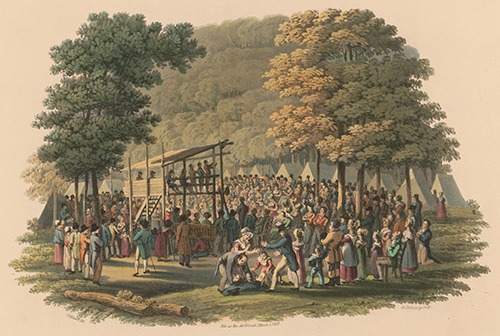
Wesley begins open-air preaching to evangelize to people neglected by the Church of England, a practice which becomes a hallmark of the Methodist revival.
Growth of Methodism
Formation of Class Meetings, cornerstone of Methodist revival and growth.

The first Methodist Conference is held in London, England.
Methodist immigrants come to North America, and begin organizing Class Meetings.
A Plain Account of Christian Perfection is first published, the doctrine that Wesley believed was “the Grand Depositum of Methodism, that for which [Methodists] were chiefly raised up.”
Methodism In America
First Methodist Society is organized in America.
1775-1783
The American War for Independence forces American Methodists to break ties with the Church of England.
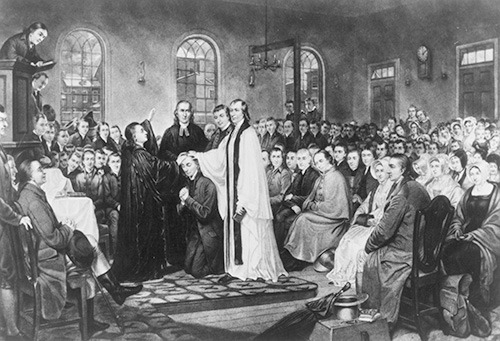
Wesley ordains Thomas Coke as Superintendent and Francis Asbury as Co-Superintendent for the work in America, leading to the formation of the Methodist Episcopal Church in the United States.
The Methodist Episcopal Church in America grows rapidly, emphasizing personal holiness and social justice. By the middle of the 19th century, Methodism becomes the largest Protestant movement in the United States. work in America, leading to the formation of the Methodist Episcopal Church in the United States.
1812-1815
War of 1812, between the United States and Britain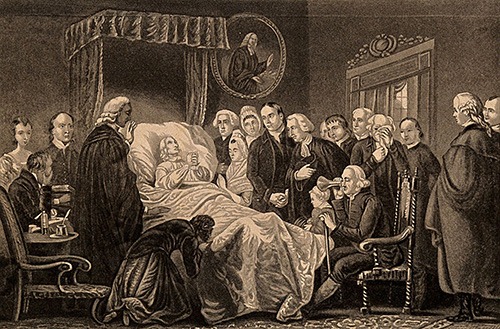
John Wesley passes away on March 2, his last words being, “Best of all, God is with us.”
The Methodist Episcopal Church splits into Northern and Southern branches over issues including slavery and governance.
Formation of the Free Methodist Church
Dissatisfaction with perceived moral laxity and lack of social justice, including issues of slavery and pew rental practices, grows within the Methodist Episcopal Church.
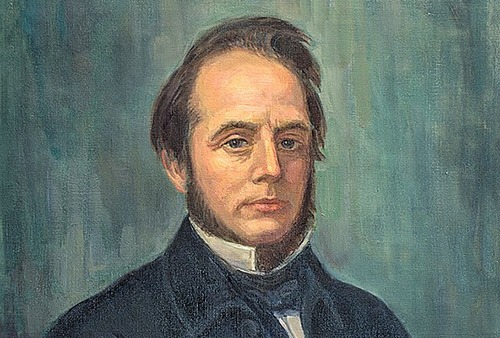
April 12, 1861 -
April 9, 1865
American Civil War, fought between the Union (Northern states) and the Confederacy (Southern states) primarily over the issues of slavery
and states' rights.Free Methodist Beginnings In Canada
Robert Loveless, a Canadian Methodist lay preacher is given a copy of B.T. Roberts’ Earnest Christian magazine. Excited by what he reads about a new “Free Methodist” movement, he invites B. T. Roberts to speak in Toronto.
Discontent grows among many Canadian Methodists over general spiritual and moral decline in their churches, which they felt was connected to the loss of emphasis on traditional Methodist teaching on personal holiness and revival practices.
The Free Methodist Church sends Rev. Charles Sage as missionary to the newly created Canada Mission District.
Sage is joined by Daniel Marstin, and their work for the next several years involved meeting with Canadian Methodists who were troubled by the move away from John Wesley’s fundamental teachings. These discontented Methodists formed new Free Methodists congregations throughout Southwestern Ontario.
FREE METHODISM IN CANADA COMES OF AGE
B.T. Roberts holds a meeting in Galt, ON to organize the Canadian Annual Conference.
Reverend Albert Simms replaces Sage, becoming the first Canadian Chairman of the Canada Conference. Other early conference appointments include both men and women.
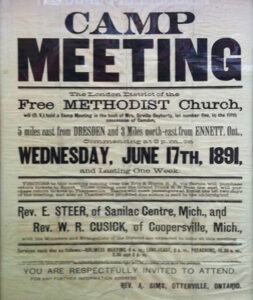
↑ Advertisement for an 1891 Camp Meeting in Ontario
Growth in the Canada Conference results in an expansion into the Canada East and Canada Great Lakes Conferences.
The first Free Methodist society in Canada to be located west of Ontario is formed at Westview, Northwest Territories (in what is now the province of Saskatchewan.)
West Canada Conference (consisting of Free Methodists in Manitoba, Saskatchewan, and Alberta) is formed.
July 28, 1914 -
Nov. 11, 1918
World War I
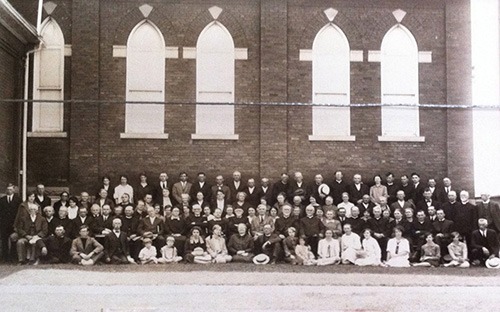
Canadian Free Methodists initiate an “All-Canada Convention” to meet in Sarnia, ON to establish more autonomy from the American parent church. The Canadian Executive Board is formed to coordinate efforts of the three Canadian Conferences and provide a unified voice in dealing with American headquarters, while maintaining strong ties with the broader Free Methodist Church.
Canadian Free Methodist Herald, a monthly journal, begins publishing.
Lorne Park College opens as a ministerial training school in Port Credit, Ontario.
The Methodist Church (Canada) merges with Presbyterians and Congregationalists to form The United Church of Canada. Free Methodist churches gain the members who did not want to join this merger.
Canadian minister and evangelist Rev. Charles Fairbairn is elected to the Board of Bishops of The Free Methodist Church, serving in USA and Canada.
Sept. 1, 1939 -
Sept. 2, 1945
World War II
Moose Jaw Bible College opens as ministerial training school for Western Canada.
The Holiness Movement Church, a small denomination with a number of churches in Eastern Ontario and Western Canada, with mission work in Egypt and Hong Kong, merges with The Free Methodist Church in Canada.
The Free Methodist Church celebrates its centennial, marking 100 years since its founding.
Canadian Jurisdictional Conference is established, and Bishop Donald Bastian is elected as Canada’s first resident Bishop.
The Free Methodist Church in Canada celebrates its 90th anniversary, reflecting on its growth and development.
FMCIC National Headquarters are established in Mississauga, ON.
The Free Methodist Church in Canada is granted status as a General Conference, meeting for the first time as such on August 6.
Bishop Gary Walsh is elected by the General Conference.
Reorganization of General Conference structure into one conference eliminates regional Annual Conferences.
Bishop Keith Elford is elected by the General Conference.
A vision for healthy churches, within reach of all people in Canada and beyond is adopted, and continues to guide the FMCIC today, with a focus on multicultural and urban ministries.
Sri Lanka Mission District is inaugurated through Canadian GC outreach.
The Free Methodist Church in Canada celebrates its centennial, marking 100 years of ministry and service.
Ghana Mission District comes under Canadian GC oversight.
The Free Methodist Church celebrates its 150th anniversary globally, highlighting its historical impact and ongoing mission.
Bishop Cliff Fletcher is elected by General Conference.
General Conference is conducted online in multiple sessions during global pandemic.
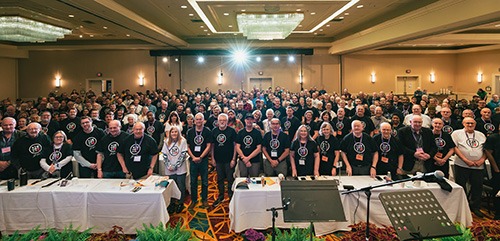
Bishop Linda Adams is elected by General Conference.



